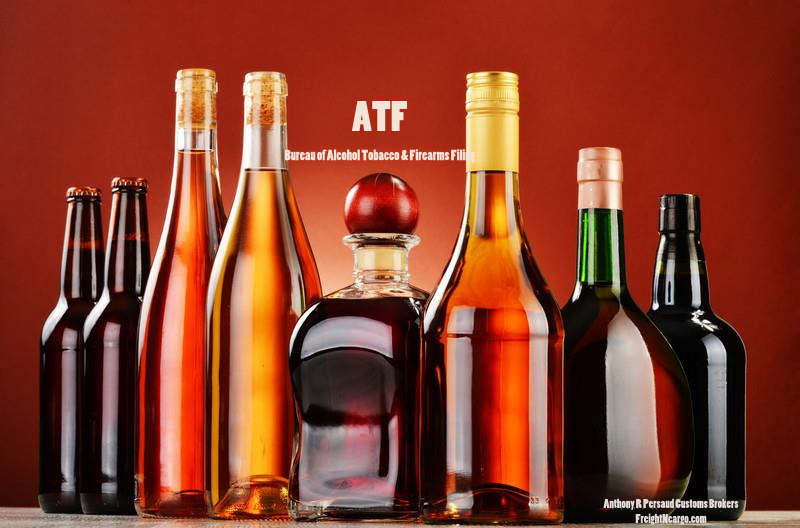When importing Alcohol for commercial purposes, you should be aware that an ATF import license is required as well as ATF import permits (COLA) for each brand and type being imported.
We can be of assistance in these types of imports as our experience in this area is quite extensive.
Any person or firm wishing to engage in the business of importing distilled spirits, wines, or malt beverages into the United States must first obtain an importer's basic permit from the Bureau of Alcohol, Tobacco and Firearms, Department of the Treasury. That agency is responsible for administering the Federal Alcohol Administration Act.
Distilled spirits imported in bulk containers of a capacity of more than one gallon may be withdrawn from Customs custody only by persons to whom it is lawful to sell or otherwise dispose of distilled spirits in bulk. Bulk or bottled shipments of imported spirits or distilled or intoxicating liquors must, at the time of importation, be accompanied by a copy of a bill of lading or other documents such as an invoice, showing the name of the consignee, the nature of its contents, and the quantity contained therein (18 U.S.C. 1263).
US Customs will not release alcoholic beverages destined to any state for use in violation of its laws, and the importation of alcoholic beverages by mail is prohibited.
The United States adopted the metric system of measurement with the enactment of the Metric Conversion Act of 1975. In general, imported wine must conform with the metric standards of fill if bottled or packed on or after January 1, 1979. Imported distilled spirits, with some exceptions, must conform with the metric standards of fill if bottled or packed on or after January 1, 1980. Distilled spirits and wines bottled or packed prior to the respective dates must be accompanied by a statement to that effect signed by a duly authorized official of the appropriate foreign country. This statement may be a separate document or may be shown on the invoice. Malt beverages including beer are not subject to metric standards of fill.
MARKING
Imported wine in bottles and other containers are required to be packaged, marked, branded, and labeled in accordance with the regulations in 27 CFR Part 4. Imported malt beverages, including alcohol free and nonalcoholic malt beverages, are also required to be labeled in conformance with the regulations in 27 CFR Part 7. The labeling regulations governing imported distilled spirits can be found in 27 CFR Part 5.
CERTIFICATE OF LABEL APPROVAL
Labels affixed to bottles of imported distilled spirits, wine and malt beverages must be covered by certificates of label approval issued to the importer by the Bureau of Alcohol, Tobacco and Firearms. Certificates of label approval or photostatic copies must be filed with Customs before the goods may be released for sale in the United States. Certificate of label approval requirements must also be met for fermented malt beverages if similar to the federal requirements (27 CFR Parts 4, 5 and 7).
FOREIGN DOCUMENTATION
Importers of wine and distilled spirits should consult the Bureau of Alcohol, Tobacco and Firearms about foreign documentation required, for example, certificates of origin, age, etc. Wines or distilled spirits from certain countries require original certificates of origin as a condition of entry.
REQUIREMENTS OF OTHER AGENCIES
In addition, the importation of alcoholic beverages is subject to the specific requirements of the Food and Drug Administration. Certain plant materials, when used for bottle jackets for wine or other liquids, are subject to special restrictions under plant quarantine regulations of the Animal and Plant Health Inspection Service. All bottle jackets made of dried or unmanufactured plant materials are subject to inspection upon arrival and are referred to the Department of Agriculture.
There is no duty waiver for shipments containing alcohol-based perfume or tobacco products unless the entire shipment is worth less than $5 retail. (19 CFR 10.153(e))
BY MAIL
Shipping alcoholic beverages by mail is prohibited by U.S. postal laws.
BY COURIER (FEDEX DHL UPS TNT)
Shipping alcoholic beverages through a courier is permitted, however, duty will be collected on the entire shipment (there is no duty exemption for alcohol not accompanying a traveler), and the courier will probably charge Handling and Customs Clearance fees that could significantly raise the cost of the shipment.
STATE ABC LAWS
Please be aware that State ABC laws govern how much alcohol a person may import into their state without a license and those laws are enforced by CBP. You must check with the state ABC board where your shipment will enter the country to determine their limits.
http://www.ttb.gov/wine/state-ABC.shtml
IMPORT QUANTITIES
There is no federal limit on the amount of alcohol someone may import into the U.S. for personal use, however, large quantities might raise the suspicion that the importation is for commercial purposes, and a CBP Officer could require you to obtain an Alcohol and Tobacco Tax and Trade Bureau (TTB) import license before releasing it.
CUSTOMS DUTY RATES
Duty rates on alcoholic beverages are based on the percent of alcohol per liter in the product - not on units of packaging such as per bottle/case. Duty on wine and beer is generally low, $1-2 per liter, while fortified wines and spirits are considerably higher.
FEDERAL EXCISE TAXES
In addition to Customs Duties, Federal IRS Excise tax is also collected. See link for IRS Excise tax rates http://www.ttb.gov/tax_audit/atftaxes.shtml





